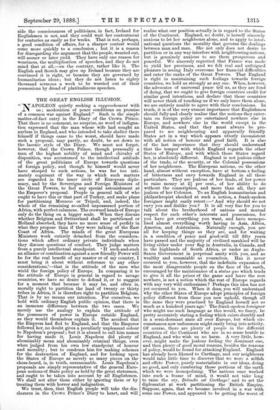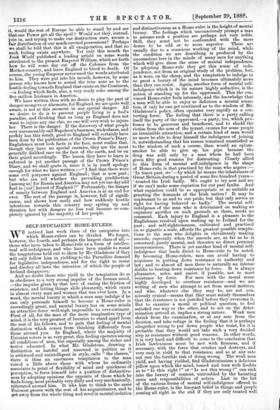THE GREAT ENGLISH ILLUSION.
" NAPOLEON quietly seeking a rapprochement with .1.N us ; moderation of peace conditions on promise of a common war against England." Such is the simple matter-of-fact entry in the Diary of the Crown Prince. That there is no comment, no surprise, no word of indigna- tion expressed that the man whose wife had sought an asylum in England, and who intended to take shelter there himself if things came to the worst, should have made such a proposal, may partly, no doubt, be set down to the laconic style of the Diary. We must not forget, however, that the Crown Prince, though personally a man of the highest nobility of mind and chivalry of disposition, was accustomed to the intellectual attitude of the great politicians of Europe towards questions of foreign policy, and though he himself would never have stooped. to such actions, he was far too inti- mately cognisant of the way in which such matters are regarded in the inner circle of European diplo- macy, and by the Sovereigns and Foreign Ministers of the Great Powers, to feel any special astonishment at the Emperor's proposal. People in general talk of who ought to have this or that part of Turkey, and make plans for partitioning Morocco or Tripoli, and, indeed, the whole of the remaining so-called unpossessed portion of Africa, with perfect calmness. The crowned heads of Europe only do the thing on a bigger scale. When they discuss whether Belgium and Switzerland shall be partitioned or Holland absorbed, they have no more sense of perfidy in what they propose than if they were talking of the East Coast of Africa. The minds of the great European Ministers work entirely detached from the considera- tions which affect ordinary private individuals when they discuss questions of conduct. They judge matters from a purely intellectual standpoint. If such-and-such an alliance or combination against a now friendly Power will be for the real benefit of my master or of my country, must bring it about without reference to any other considerations,'—that is the attitude of the men who wield the foreign policy of Europe. In comparing it to the attitude of Europe in general in regard to savage countries, we have no desire to defend it, or to suggest for a moment that because it may be, and often is, morally right to partition the land of twenty or thirty tribes in Africa, it is therefore right to partition Belgium. That is by no means our intention. For ourselves, we hold with ordinary English public opinion, that there is an immense difference between the two cases. We merely use the analogy to explain the attitude of the possessors of power in Europe outside England, as they would themselves explain it. The accident that the Empress had fled to England, and that the Emperor followed her, no doubt gives a peculiarly unpleasant colour to Napoleon's proposal ; but it is absurd to call him names for having made it. Louis Napoleon did plenty of abominably mean and abominably criminal things, even when judged from his own low standpoint of honour and morality ; but to condemn him for making schemes for the destruction of England, and for looking upon the States of Europe as merely so many pieces on the chess-board, is, in truth, unreasonable. Louis Napoleon's proposals are simply representative of the general Euro- pean notions of State policy as held by the great statesmen, and ought to be taken into account by all Englishmen. We shall not alter them either by ignoring them or by treating them with horror and indignation.
We trust, then, that English people will take the dis- closures in the Crown Prince's Diary to heart, and will I realise what our position actually is in regard to the States of the Continent. England, no doubt, is herself sincerely anxious to let her neighbours alone, and to apply to inter- national questions the morality that governs the dealings between man and man. She not only does not desire to partition or in any way interfere with neighbouring nations, but is genuinely anxious to see them prosperous and peaceful. We sincerely regretted that France was made to yield her provinces, and we felt real and unfeigned pleasure in seeing Italy overcome her financial difficulties and enter the ranks of the Great Powers. That England is right in maintaining such feelings towards foreign countries, we hold as strongly as any one. When, however, the advocates of universal peace tell us, as they are fond of doing, that we ought to give foreign countries credit for similar good. intentions, and declare that those countries will never think of touching us if we only leave them alone, we are entirely unable to agree with their conclusions. In truth, it is of the very utmost importance that Englishmen should fully and clearly realise that the notions they enter- tain on foreign policy are entertained nowhere else in Europe, and nowhere else in the world except in the- United States, and that they must always be pre- pared to see neighbouring and apparently friendly States act in a way which appears utterly inconsistent with all notion of honour and good faith. It is also of the last importance that they should understand that the temper with which England regards the other States of Europe, and with which those States regard her, is absolutely different. England is not jealous either of the trade, or the security, or the Colonial possessions of her neighbours. The European nations, on the other hand, almost without exception, have at bottom a feeling of bitterness and envy towards England in all these particulars. They are jealous of her trade, of her power to raise money at 21 per cent., of her ability to do- without the conscription, and more than all, they are jealous of her Colonies. To an English humanitarian and philanthropist shocked at such a notion, a frank-spoken foreigner might easily retort And why should we not envy you and dislike you ? It is all very fine for you to talk about the brotherhood of nations and mutual respect for each other's interests and possessions, for you have got everything you want, and have monopo- lised almost everything worth having in Asia, Africa, America, and Australasia. Naturally enough, you are all for keeping things as they are, and for waiting in a condition of peace and good-will till fifty years. have passed and the majority of civilised mankind will be living either under your flag in Australia, in Canada, and in the highlands of South Africa, or under an Anglo- Saxon Government in perpetual amity with you, and as wealthy and unamiable as yourselves. Has it never occurred to you, however, that the indefinite expansion of the most disagreeable people on the face of the earth, encouraged by the maintenance of a status quo which tends to give it all the prizes of the game and leave the rest nowhere, is not a notion which the rest of ,Europe regards with any very wild enthusiasm ? Perhaps this idea has not yet occurred to you. When it does, you will understand why the other States of _Europe adopt principles of foreign policy different from those you now uphold, though all the same they were practised by England herself not so much as a hundred.years ago.' The frank-spoken foreigner who might use such language as this would, we fancy, be pretty accurately stating a feeling which exists dumbly and in a semi-dormant state all over Europe, but which cir- cumstances now unforeseen might easily bring into activity. Of course, there are plenty of people in the different countries of the Continent who are in no sense hostile to England, and who wish us no harm. A very little, how- ever, might make the jealous feeling the dominant one, and then plenty of good moral reasons, besides the reasons of policy, would be found for attacking England. England has already been likened to Carthage, and our neighbours would take little time to discover that we were a selfish and effete Power, purely materialistic in our ideas, doing no good, and only cumbering those portions of the earth which we were ,monopolising. The nations once worked into such a frame of mind, it would not take long to raise the ery, Delencla est Carthago! and to set the diplomatist at work partitioning the 'British Empire. Suppose, again, that we became involved in a war with some one Power, and appeared to be getting the worst of .it, would the rest of Europe be able to stand by and see that one Power get all the spoil ? Would not they, instead, join in, and trying to make our destruction sure, secure a fair distribution of our much coveted possessions? Perhaps we shall be told that this is all exaggeration, and that no such feeling exists anywhere. Yet only this month the Irish, World published a leading article on some words attributed to the present Emperor William, which set forth how he will some day cut off the Colonies from the Mother-country, and leave England to bleed to death. Of course, the young Emperor never used the words attributed to him. They were put into his mouth, however, by some person who knows how to sound the true note as to the hostile feeling towards England that exists on the Continent, —a feeling which finds, also, a very ready echo among the • five million Irishmen in America.
We have written thus with no desire to play the part of danger-mongers or alarmists, for England, we are quite well aware, is not at this moment in any special danger. All we desire to do is to prevent people living in a fool's paradise, and thinking that as long as England does not want to injure any one else, no one will ever wish to injure her. There is the danger. If the discovery of what people .very unreasonably call Napoleon's baseness, wickedness, and perfidy has this result, good to England will certainly have been done by the publication of the Crown Prince's Diary Englishmen must look facts in the face, must realise that, though they have no special enemies, they are the most generally disliked race on the face of the earth, and be on their guard accordingly. The lesson they have to learn is enforced in yet another passage of the Crown Prince's Diary, and we shall quote it, since it is in itself apology enough for what we have written :—" I find that there were some evil purposes against England; that is now past ; but who can tell whether the prevailing predilection ,[among us] for Russia and America may not yet one day add fuel to [our] hatred of England ?" Fortunately, the danger of enmity between England and America is at an end for ever. The rest of the passage is, however, full of signifi- cance, and shows how easily and how suddenly hostile intentions towards this country may spring up and threaten her with dangers no less real because so cora- Ibletely ignored by the majority of her people.







































 Previous page
Previous page